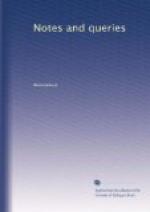Paying through the Nose, and Etymology of Shilling (Vol. i., p. 335.).—Odin, they say, laid a nose-tax on ever Swede,—a penny a nose. (Grimm, Deutsche Rechts Alterthuemer, p. 299.) I think people not able to pay forfeited “the prominence on the face, which is the organ of scent, and emunctory of the brain,” as good Walker says. It was according to the rule, “Qui non habet in aere, luat in pelle.” Still we “count” or “tell noses,” when computing, for instance, how many persons of the company are to pay the reckoning. The expression is used in England, if I am rightly informed, as well as in Holland. {349}
Tax money was gathered into a brass shield, and the jingling (schel) noise it produced, gave to the pieces of silver exacted the name of schellingen (shillings). Saxo-Grammaticus, lib viii. p. 267., citatus apud Grimm, l. 1. p. 77. The reference is too curious not to note it down:—
“Huic (Fresiae) Gotricus nom tam arctam, quam inusitatam pensionem imposuit, de cujus conditione et modo summatim referam. Primum itaque ducentorum quadraginta pedum longitudinem habentis aedificii structura disponitur, bis senis distincta spatiis, quorum quodlibet vicenorum pedum intercapedine tenderetur, praedictae quantitatis summam totalis spatii dispendio reddente. In hujus itaque aedis capite regio considente quaestore, sub extremam ejus partem rotundus e regione elipeus exhibetur. Fresonibus igitur tributum daturis mos erat singulos nummos in hujus scuti cavum conjicere, e quibus eos duntaxat in censum regium ratio computantis eligeret, qui eminus exatoris aures clarioris soni crepitaculo perstrinxissent quo evenit, ut id solum aes quaestor in fiscum supputando colligeret, cujus casum remotiore auris indicio persensisset, cujus vero obscurior sonus citra computantis defuisset auditum, recipiebatur quidem in fiscum (!!!), sed nullum summae praestabat augmentum. Compluribus igitur nummorum jactibus quaestorias aures nulla sensibili sonoritate pulsantibus, accidit, ut statam pro se stipem erogaturi multam interdum aeris partem inani pensione consumerent, cujus tributi onere per Karolum postea liberati produntur.”
JANUS DOUSA.
Huis te Manpadt.
Small Words (Vol. ii., p. 305.).—Some of your correspondents have justly recommended correctness in the references to authorities cited. Allow me to suggest the necessity of similar care in quotations. If K.J.P.B.T. had taken the pains to refer to the passage in Pope which he criticises (Vol. ii., p. 305.), he would have spared himself some trouble, and you considerable space. The line is not, as he puts it, “And ten small words,” but—
“And ten low words oft creep in one dull line.”
a difference which deprives his remarks of much of their applicability.
[Greek: PH.]
Bilderdijk the Poet (Vol. ii., p. 309.).—There are several letters from Southey, in his Life and Correspondence, written while under the roof of Bilderdijk, giving a very agreeable account of the poet, his wife, and his family.




